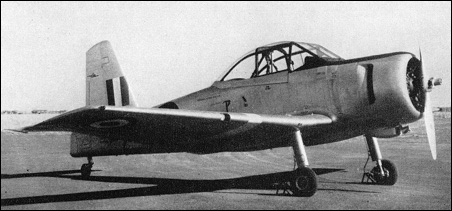|
| The CA-25, which first flew on February 23, 1955, is the production version of the CA-22, the prototype Winjeel, which made its maiden flight in 1950.
| WEIGHTS |
| Take-off weight | 1970 kg | 4343 lb |
| Empty weight | 1530 kg | 3373 lb |
| DIMENSIONS |
| Wingspan | 11.77 m | 39 ft 7 in |
| Length | 8.55 m | 28 ft 1 in |
| Height | 2.77 m | 9 ft 1 in |
| PERFORMANCE |
| Max. speed | 299 km/h | 186 mph |
| Cruise speed | 265 km/h | 165 mph |
| Ceiling | 5490 m | 18000 ft |
| Colin Wilson, 21.02.2025 00:00 I trained at RAAF Uranquinty,with about 8 other guys in a RAN group,arriving about April 1956.I would like to connect up with any of the otherPNA(P)s reply | | Bill Q., e-mail, 26.07.2014 20:07 In 1959 I was taught on this a /c at 1BFTS PCK (35 Course). It was the first aeroplane I flew (but not the last)and I recall it having two spins, stable and unstable - which was really a spiral dive, building up 3 /4g /turn and fell out as soon as the controls were centralised. Definitely had to work a little to recover from a well developed stable spin, though. reply | | Jack Frost, e-mail, 17.07.2014 00:40 As an RAF pom fitter served at Woomera 59 /62. Enjoyed being a 'flying spanner' on a survey trip in a Winjeel staying over at Tarcoola - what an introduction to life in a bush community.
Almost as good as the settings in the Aboriginal detective Boney books! reply | | John Laming, e-mail, 22.06.2013 07:30 I flew around 600 hours on Winjeels as a QFI at No 1 BFTS Uranquinty. In fact we were the first instructors to introduce the Winjeel at Uranquinty, having done only one hour on the aircraft during the instructors course at CFS RAAF East Sale. Initially we thought students would have serious problems using this aircraft as their ab-initio trainer after the simple cockpit of the Tiger Moth.
We were wrong as it turned out. Time to first solo was about the same as the Tiger Moth - in other words between 8 and 11 hours of dual instruction. The Winjeel was a fine trainer as was the Wirraway. Certainly more comfortable to fly than the Tiger Moth which like any open-cockpit type was damnably cold in winter. Navigation flying was easier too, with no chance of losing maps and navigation logs over the side as often happened in Tiger Moths. reply | |
| | Robert Fraser, e-mail, 29.01.2013 23:54 As an apprentice at De Havilland aircraft company at Bankstown airfield I worked on the wings and other components for the winjeel reply | | Keith Walker, e-mail, 10.02.2011 00:21 Note correction to my email address. While I am commenting I would also describe ejection test of the large canopy. A lincoln bomber was placed in front of the Winjeel with engines at max power and winjeel canopy released very successfully clearing the fin but missing the catching net so test was really too successful reply |
| Keith Walker, e-mail, 10.02.2011 00:13 I worked on the Winjeel on my graduation from the Melbourne Technical College now RMIT in 1951.Most of my work was the design of the Petal Cowlings which was a different idea for cowling a radial engine at that time and took quite a lot of time. reply |
| Gus, e-mail, 29.11.2010 17:37 I heard a story of a decorated RAAF AVM who ground looped a RAAF museum Winjeel at Philip Island aerodrome thereby taking out the runway lighting system. Can anyone add substance to this story? reply |
|
Do you have any comments?
|
| 
COMPANY
PROFILE
All the World's Rotorcraft
|






 Keith Walker
Keith Walker
20
reply